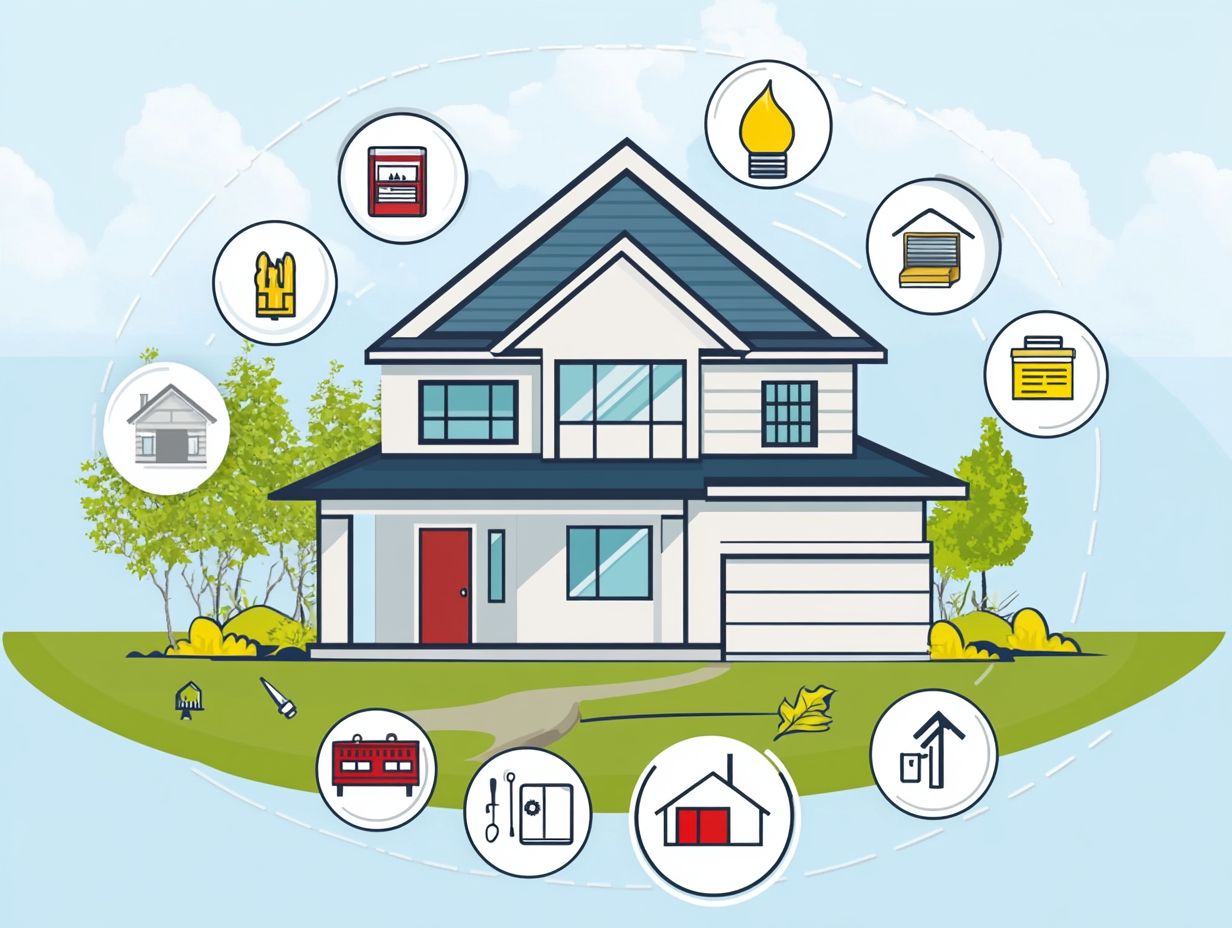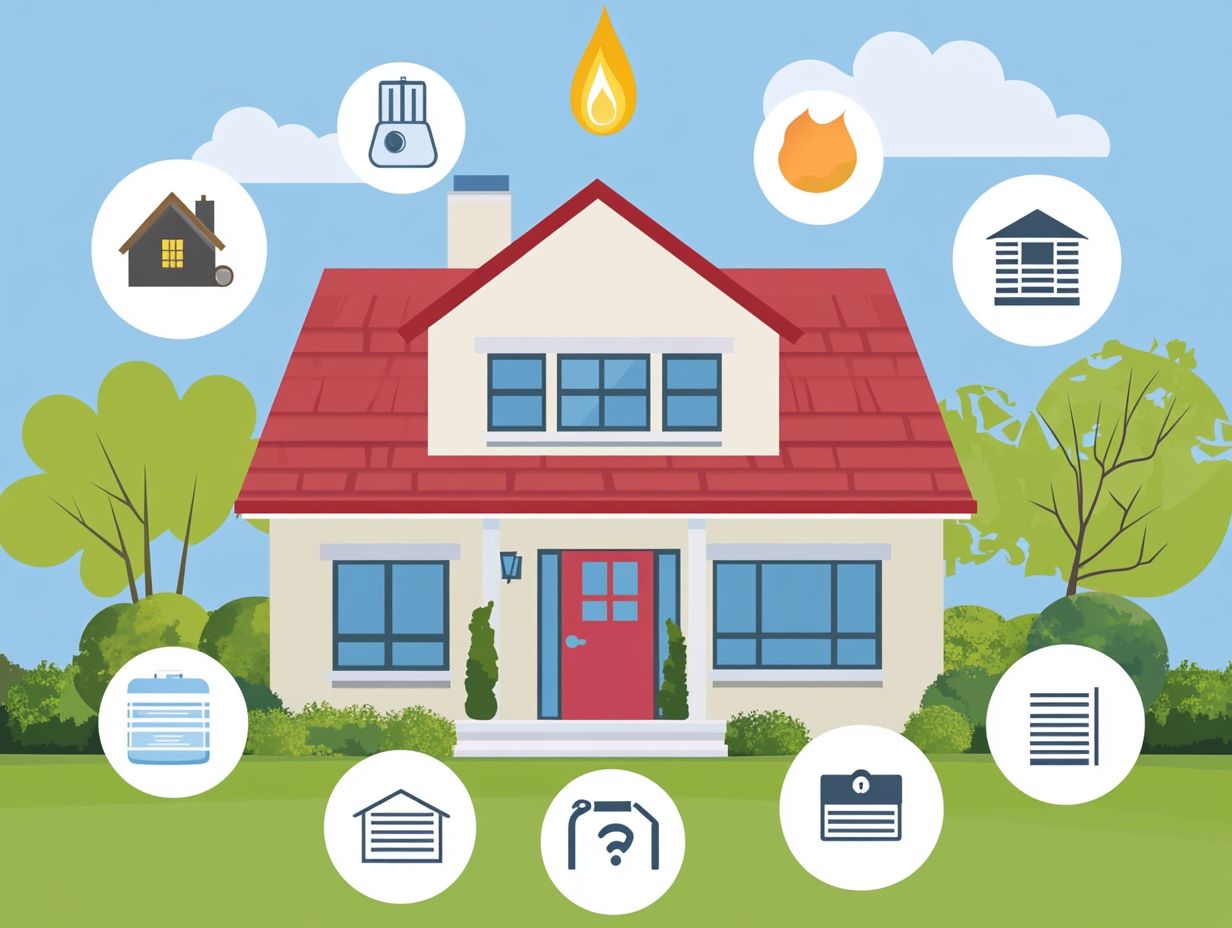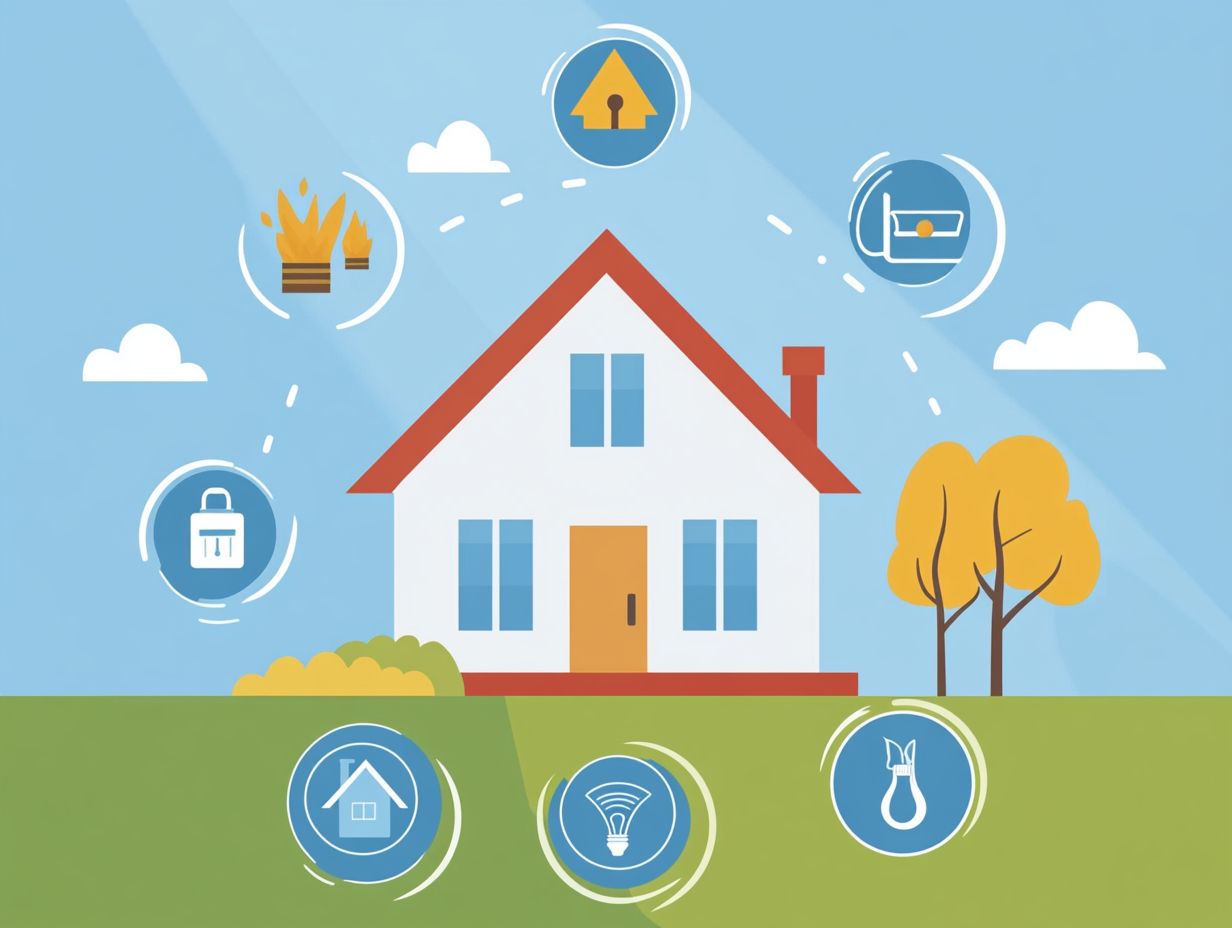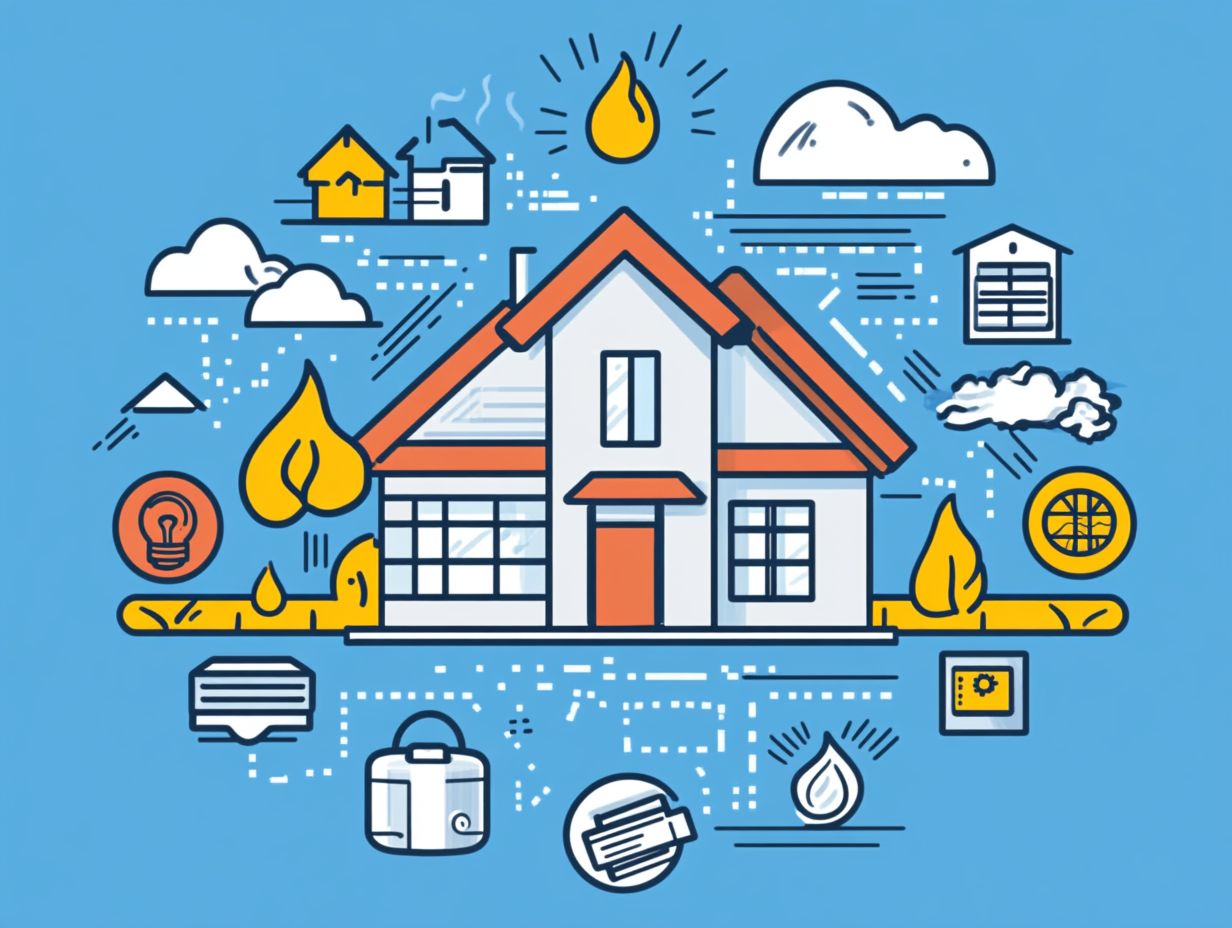Key Features of Comprehensive Home Insurance
Homeowner’s insurance transcends the notion of a mere safety net; it stands as an essential pillar in safeguarding your most cherished asset your home.
This guide delves into the fundamentals of homeowner’s insurance, exploring various coverage types such as dwelling, personal property, and liability (being responsible for injuries to others on your property).
You ll uncover additional features that can elevate your policy, understand the factors that sway insurance rates, and receive valuable insights for selecting the coverage that perfectly aligns with your needs.
By grasping these elements, you empower yourself to make informed decisions, ensuring not just protection but also peace of mind.
Contents
- Key Takeaways:
- Understanding Homeowner’s Insurance
- Types of Homeowner’s Insurance Coverage
- Additional Features of Comprehensive Home Insurance
- Factors Affecting Home Insurance Rates
- Choosing the Right Home Insurance
- Preguntas Frecuentes
- Cu les son las caracter sticas clave del seguro de hogar integral?
- Qu cubre el seguro de hogar integral para la estructura de mi hogar?
- Qu pertenencias personales est n cubiertas bajo el seguro de hogar integral?
- Qu riesgos est n t picamente cubiertos bajo una p liza de seguro de hogar integral?
- Puedo agregar cobertura adicional a mi p liza de seguro de hogar integral?
- Incluye el seguro de hogar integral cobertura de responsabilidad civil?
Key Takeaways:

Home insurance is your shield against disaster! It covers structural damage, personal property, and liability claims. Make sure to explore features like loss of use and medical payments for added protection.
Understanding Homeowner’s Insurance
Understanding homeowner’s insurance is essential for safeguarding your property and personal belongings, particularly in regions like New York State with its specific insurance requirements.
Homeowner’s insurance includes a range of policies designed to protect not only the physical structure of your home but also personal liability, ensuring your peace of mind.
Selecting the right coverage options requires a thoughtful risk assessment of potential perils you may face, such as the need for flood insurance or protection against earthquake damage. This personalized approach helps you build the perfect policy for your needs!
This tailored approach allows you to create a policy that meets your unique needs, including coverage for additional living expenses in the event of significant damage.
What is Homeowner’s Insurance?
Homeowner’s insurance, often referred to as homeowner’s insurance, is a crucial policy that shields you from financial loss stemming from property damage or liability for injuries to others. This type of insurance is essential for safeguarding your investment in your home, covering a myriad of risks such as natural disasters, theft, and accidents that may occur on your property.
Typically, the policy includes dwelling coverage, which protects the structure itself, personal property coverage for your belongings, and liability protection that offers financial support if someone gets injured on your premises.
As you navigate the intricacies of personal finance, weaving homeowner’s insurance into your overall insurance portfolio becomes vital. It not only grants you peace of mind but also meets mortgage requirements, effectively helping you protect your investment.
Types of Homeowner’s Insurance Coverage
The types of homeowner’s insurance coverage available to you are diverse, designed to meet the unique needs of property owners like yourself. It’s important to understand the top considerations for home insurance types, which include essential components such as:
- Dwelling protection
- Personal property coverage
- Liability insurance
All aimed at providing a comprehensive safety net for homeowners.
Dwelling Coverage
Dwelling coverage is an essential aspect of homeowner’s insurance that safeguards the physical structure of your home against a range of insured perils, offering either replacement cost or actual cash value for any damages incurred. This type of coverage is specifically designed to provide financial support in the wake of disasters such as fires, hurricanes, vandalism, or other significant, unexpected damages.
Several factors can influence your coverage limits, including the local real estate market, the square footage of your home, and the quality of materials used during construction.
For homeowners like you, having adequate dwelling insurance is crucial. It acts as a safety net against potential risks, ensuring that you have the means to rebuild or repair your home without facing substantial out-of-pocket expenses.
For example, if your home suffers damage from a severe storm, having the right dwelling coverage will help cover the repair costs, granting you peace of mind during what can often feel like a vulnerable time.
Personal Property Coverage
Personal property coverage in your homeowners insurance protects your belongings like furniture, electronics, and clothing from damage or theft. This coverage provides essential financial support during a crisis and grants you peace of mind knowing your valued possessions are secure.
To maximize the benefits of this policy, conducting a home inventory is vital. This inventory allows you to create a detailed list of your possessions, simplifying the claims process if you experience a loss.
Commonly covered items include:
- Appliances
- Jewelry
- Musical instruments
However, be aware that certain high-value items may require additional policies. When determining the right coverage limits, assess the total value of your personal belongings, including depreciation and replacement costs. This ensures you are adequately insured for unforeseen circumstances.
Liability Coverage

Liability coverage is a critical part of homeowners insurance. It protects you from legal claims arising from injuries or damages on your property, including medical payments for injured guests. This coverage helps you avoid potentially substantial financial setbacks.
For example, if a guest slips and falls on your icy walkway, liability coverage can help cover their medical expenses and any legal fees if they choose to take legal action. This protection also includes scenarios like a neighbor’s child getting injured by your pet or damage caused by a fallen tree.
It s essential to understand the nuances of liability coverage, especially regarding policy exclusions. Certain situations like intentional harm or business-related incidents may not be included, leaving you exposed.
Additional Features of Comprehensive Home Insurance
Comprehensive home insurance offers features beyond standard coverage. It includes loss of use coverage, which supports you during significant repairs, and medical payments coverage for accidents that may occur on your property. When choosing a policy, consider the key features to look for in home insurance providers.
You can also enhance your protection with personal liability umbrella policies, offering an extra layer of security and peace of mind.
Loss of Use Coverage
Loss of use coverage is crucial in comprehensive home insurance. It compensates you for additional living expenses when your home becomes uninhabitable due to a covered peril. Understanding the importance of home insurance is invaluable during the claims process, ensuring you maintain a certain standard of living despite unexpected disruptions.
For instance, if a fire damages your property, you might need a hotel room or temporary rental while repairs are underway. This coverage typically includes expenses such as hotel bills, dining out, and other necessary costs that exceed your usual living expenses.
Scenarios like natural disasters, significant plumbing failures, or major appliance breakdowns are just a few situations where loss of use coverage can alleviate financial strain during tough times.
Medical Payments Coverage
Medical payments coverage in homeowners insurance provides essential financial support for medical expenses incurred by guests injured on your property, regardless of fault. This coverage ensures peace of mind for you as a homeowner.
This vital component works with general liability coverage, creating a safety net that protects you from unexpected medical costs stemming from accidents.
While general liability addresses broader claims against you, medical payments coverage focuses on immediate medical expenses. This allows injured parties to receive timely care without the stress of protracted legal disputes.
By having this coverage, you demonstrate a commitment to hospitality, reassuring your guests that their well-being is a priority. This fosters trust and strengthens community relationships, making your home a welcoming place.
Don’t leave your valuables unprotected! Get in touch with your insurance agent today to ensure you have the right coverage!
Personal Liability Umbrella
Don t wait until it s too late protect your assets today! A personal liability umbrella policy elevates the liability protection offered by standard homeowners insurance, providing you with an extra layer of security against claims that might exceed your policy limits.
This type of coverage is particularly useful for homeowners who engage in activities that could increase the risk of accidents, such as owning a swimming pool, hosting frequent gatherings, or having pets.
By extending beyond basic coverage, it shields you from unforeseen circumstances that could lead to hefty legal costs or settlement amounts.
As your assets grow, it s crucial to consider additional protection to keep them safe from potential lawsuits. Evaluating your specific risks and contemplating this coverage can give you peace of mind and financial security.
Factors Affecting Home Insurance Rates
Numerous elements play a significant role in shaping your home insurance rates. These include your property s location, specific risk factors unique to your home, and the reputation of various insurance providers in the market.
Location and Property Features

The geographical location of your home and its unique features significantly influence your insurance rates. Factors such as local crime rates and proximity to natural disaster zones are crucial in shaping overall risk assessments.
Insurance providers also look at your property’s condition. Well-maintained homes typically signal a lower risk of claims. By incorporating advanced security systems, you can further mitigate risks, which may lead to reduced premiums. Homes equipped with alarms or surveillance cameras not only help deter criminal activity but also provide peace of mind to insurers.
If your property is located in a vulnerable area, however, you might face higher rates due to an increased likelihood of damage from flooding or wildfires. This emphasizes the importance of comprehensive home assessments when determining your coverage costs.
Personal Factors
Personal factors like your claims history, credit score, and the presence of certain risk elements significantly impact the insurance rates offered by various providers.
If you have a clean claims record, you ll likely enjoy lower premiums since insurers see you as less of a risk. A strong credit history is vital as well; insurers often interpret it as a sign of reliability and financial responsibility.
Frequent claims, on the other hand, could raise eyebrows and lead to higher rates.
By understanding these nuances, you can take proactive steps to enhance your profile, such as paying your bills on time and avoiding unnecessary claims, ultimately setting yourself up for more favorable insurance terms.
Choosing the Right Home Insurance
Selecting the ideal home insurance involves thoughtful evaluation of your coverage requirements, comparing quotes from various insurance providers, and considering the elements that enhance overall policyholder satisfaction.
Assessing Coverage Needs
Assessing your coverage needs is a vital first step in selecting homeowners insurance. This process involves evaluating risk factors and creating a detailed inventory of your personal property.
By doing this, you not only gain insight into how much insurance you truly need but also uncover potential vulnerabilities that may require extra protection. Walk through each room of your home, documenting valuable items like electronics, furniture, and collectibles. Snap photographs and jot down serial numbers; this can make the claims process much smoother if you ever face loss or damage.
Moreover, consider specific risks related to your local environment, such as exposure to floods or earthquakes, which may call for additional coverage. Being thorough in your assessment enhances your understanding of your unique situation, guiding you toward more tailored insurance solutions.
- Document valuable items in each room.
- Take photographs and note serial numbers.
- Evaluate local environmental risks.
Comparando Cotizaciones y Proveedores
Comparar cotizaciones de varios proveedores de seguros es un paso crucial para proteger tu hogar! Comparar cotizaciones de varios proveedores de seguros es esencial para ti como propietario de una vivienda. Esto te ayudar a descubrir las mejores tarifas de seguro y opciones de cobertura, mientras mantienes un ojo en las exclusiones de la p liza.
Este proceso implica examinar m ltiples ofertas para asegurarte de encontrar una cobertura integral adaptada a tus necesidades individuales. Es importante que te tomes el tiempo para evaluar los l mites de cobertura. Estos determinan la cantidad m xima que tu aseguradora pagar por da os.
Identificar cualquier exclusi n potencial tambi n es crucial. Estas podr an dejar ciertos da os no cubiertos y afectar significativamente tu seguridad financiera si alguna vez necesitas presentar un reclamo.
Los descuentos en las primas pueden variar ampliamente entre proveedores. A menudo est n disponibles por agrupar p lizas o mantener buenos puntajes de cr dito.
Al evaluar cuidadosamente estos factores, puedes tomar una decisi n m s informada y proteger una p liza de seguro que ofrezca tanto un valor excepcional como tranquilidad. Comienza hoy mismo tu b squeda para encontrar la mejor p liza para ti!
Preguntas Frecuentes
Cu les son las caracter sticas clave del seguro de hogar integral?

Las características clave del seguro de hogar integral incluyen cobertura para tanto la estructura de tu hogar como tus pertenencias personales, protección contra una amplia gama de riesgos, opciones para cobertura adicional y cobertura de responsabilidad civil.
Qu cubre el seguro de hogar integral para la estructura de mi hogar?
El seguro de hogar integral t picamente cubre da os a la estructura de tu hogar causados por desastres naturales, incendios, robos y vandalismo. Esto incluye da os al interior y exterior de tu hogar, as como a cualquier estructura adjunta, como garajes o cobertizos.
Qu pertenencias personales est n cubiertas bajo el seguro de hogar integral?
El seguro de hogar integral t picamente cubre tus pertenencias personales, como muebles, electr nicos y ropa, contra da os o p rdidas debido a riesgos cubiertos. Tambi n puede cubrir tus pertenencias cuando est n fuera de tu hogar, como cuando est s viajando.
Qu riesgos est n t picamente cubiertos bajo una p liza de seguro de hogar integral?
El seguro de hogar integral generalmente cubre una amplia gama de riesgos, incluidos incendios, robos, vandalismo, tormentas de viento, granizo y da os por agua de tuber as rotas o aparatos defectuosos. Sin embargo, es importante revisar cuidadosamente tu p liza para entender exactamente qu est cubierto.
Puedo agregar cobertura adicional a mi p liza de seguro de hogar integral?
S ! Muchas compa as de seguros ofrecen cobertura opcional para tipos espec ficos de riesgos, como terremotos, inundaciones o robo de identidad. Tambi n es posible que puedas aumentar los l mites de cobertura para ciertos art culos, como joyas de alto valor o electr nicos.
Incluye el seguro de hogar integral cobertura de responsabilidad civil?
S ! Las p lizas de seguro de hogar integral t picamente incluyen cobertura de responsabilidad civil, que te protege si alguien resulta herido en tu propiedad o si accidentalmente causas da os a la propiedad de otra persona. Esta cobertura tambi n puede ayudar a cubrir honorarios legales si eres demandado por estos tipos de incidentes.





